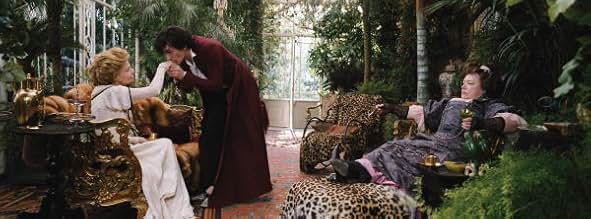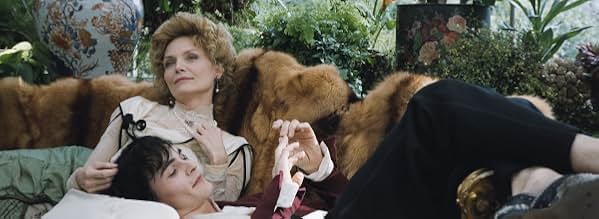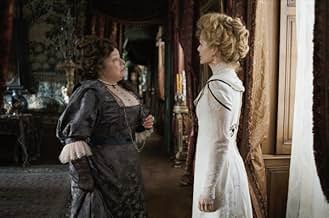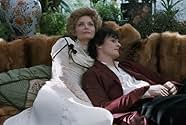The son of a courtesan retreats into a fantasy world after being forced to end his relationship with the older woman who educated him in the ways of love.The son of a courtesan retreats into a fantasy world after being forced to end his relationship with the older woman who educated him in the ways of love.The son of a courtesan retreats into a fantasy world after being forced to end his relationship with the older woman who educated him in the ways of love.
- Director
- Writers
- Stars
- Awards
- 3 wins & 2 nominations total
- Director
- Writers
- All cast & crew
- Production, box office & more at IMDbPro
Featured reviews
One of the delights of this film is the lushness and perfection of the sets and costumes of the Belle Époque (c. 1890-1914). The sets and costumes are so gorgeous they threaten to overwhelm the actors. Threaten, but don't succeed. Michelle Pfeiffer is sensual and beautiful as the aging courtesan Lea—a woman approaching a "certain age," as the narrator (Stephen Frears) informs us. Lea has known the love and admiration of the wealthiest men in Europe, many of them titled. She has been wise to keep her heart out of her affairs. Then Fred, ("Cheri") the son of another courtesan (Kathy Bates) enters Lea's life, and she finds herself caring for the aimless but charming young man more than she should.
Kathy Bates is wonderful as Madame Peloux, a former competitor of Lea's—a woman who, if you squint hard (and catch the "portrait" of a younger Peloux) you can imagine having a gamine charm years before. Bates' acting moves effortlessly from laughing delightedly at smutty gossip to quickly assuming the pouting self-righteous expression of a disapproving mama as she discusses her son. From former courtesan to bourgeois matron in the blink of an eye. Bates carries this quick switch act off several times in the movie, and it's a pleasure to watch her skill at these rapid changes. The sets and costumes of Mme. Peloux, heavy 2nd Empire furnishings, stiff wired dressed with bustles, are beautifully contrasted with Lea's lighter look—slender, graceful, light. The clothes each character wears, and the styles of their respective homes, gives some subtext to the story. Mme. Peloux, a bit older than Lea, had her taste formed in an era of overdone stuffy pretentiousness, while Lea, a bit younger, has embraced the airy beauty of Art Nouveau.
The stultifying life of aging and former courtesans is well-depicted—unwelcome in respectable society they have to fall back on each other's company. Former competitors, they still can't help sniping at one another. Lea, as one of the youngest of the group, moves like a sylph among the faded charms of her cohort. One amazing scene: Among a bower of faded courtesans, one of them, a busty brassy red-head, cuddles and squeals like a teenager as she introduces her lover, a young man who's the son of one this woman's "official lovers." As she overwhelms the rather weedy young man with her caresses, the viewer can see Lea's discomfort—seeing the loud red-head and her boy lover seems like seeing a grotesque mockery of herself and Cheri.
Cheri, the title character, is played by Rupert Friend (Prince Albert in "The Young Victoria," and Mr. Wickham in the 2005 version of "Pride and Prejudice"). He's a young man who has only two responsibilities: marry, and manage the large amount of money his mother settles on him at his marriage. He's a young man without purpose, but finds love with Lea. What starts as a light-hearted affair turns into a relationship both Cheri and Lea need more than they realized. Lea and Cheri's affair ends—as does the wonderful era depicted in this gorgeous movie. The war ends Lea and Cheri's world. The 20th century starts with bleakness and hardness after the golden afternoon of La Belle Époque. We are indebted to Collette and Stephen Frears for showing us the loveliness, and even the artful decadence, of that time, and we are indebted to the talented cast for giving life to the "demi-monde" ("half-world") of that era.
Kathy Bates is wonderful as Madame Peloux, a former competitor of Lea's—a woman who, if you squint hard (and catch the "portrait" of a younger Peloux) you can imagine having a gamine charm years before. Bates' acting moves effortlessly from laughing delightedly at smutty gossip to quickly assuming the pouting self-righteous expression of a disapproving mama as she discusses her son. From former courtesan to bourgeois matron in the blink of an eye. Bates carries this quick switch act off several times in the movie, and it's a pleasure to watch her skill at these rapid changes. The sets and costumes of Mme. Peloux, heavy 2nd Empire furnishings, stiff wired dressed with bustles, are beautifully contrasted with Lea's lighter look—slender, graceful, light. The clothes each character wears, and the styles of their respective homes, gives some subtext to the story. Mme. Peloux, a bit older than Lea, had her taste formed in an era of overdone stuffy pretentiousness, while Lea, a bit younger, has embraced the airy beauty of Art Nouveau.
The stultifying life of aging and former courtesans is well-depicted—unwelcome in respectable society they have to fall back on each other's company. Former competitors, they still can't help sniping at one another. Lea, as one of the youngest of the group, moves like a sylph among the faded charms of her cohort. One amazing scene: Among a bower of faded courtesans, one of them, a busty brassy red-head, cuddles and squeals like a teenager as she introduces her lover, a young man who's the son of one this woman's "official lovers." As she overwhelms the rather weedy young man with her caresses, the viewer can see Lea's discomfort—seeing the loud red-head and her boy lover seems like seeing a grotesque mockery of herself and Cheri.
Cheri, the title character, is played by Rupert Friend (Prince Albert in "The Young Victoria," and Mr. Wickham in the 2005 version of "Pride and Prejudice"). He's a young man who has only two responsibilities: marry, and manage the large amount of money his mother settles on him at his marriage. He's a young man without purpose, but finds love with Lea. What starts as a light-hearted affair turns into a relationship both Cheri and Lea need more than they realized. Lea and Cheri's affair ends—as does the wonderful era depicted in this gorgeous movie. The war ends Lea and Cheri's world. The 20th century starts with bleakness and hardness after the golden afternoon of La Belle Époque. We are indebted to Collette and Stephen Frears for showing us the loveliness, and even the artful decadence, of that time, and we are indebted to the talented cast for giving life to the "demi-monde" ("half-world") of that era.
Aging, Michelle Pfeiffer has become what Oscar Wilde called "That abomination of nature: A Handsome Woman". Her very trimmed figure looks spectacular sheathed in very glamorous Belle Epoque dresses and looking at her with contemporary eyes, that's fine.
What the director forgot in recreating so beautifully, so painfully all the paraphernalia necessary to reproduce that magnificent time in history was... the ideal of feminine beauty at the time.
We glaringly see it in the same old pictures (authentic) shown at the start of the movie, pictures of the great beauties then, like Lillie Langtry, Lia de Putti, la Bella Otero, etc. and it's obvious that those beauties where more on the side of Marilyn Monroe than Michelle Pfeiffer, who looks like a window display mannequin with no curves in the right places and no minimal waistline (Hourglass figure painfully obtained thanks to an oppressing corset, but there it was).
To give us total recall of that time our protagonist should have been somebody a bit fatter than Ms. Pfeiffer, since we readily forget all the changes the feminine figure has suffered just in the last 100 years; what was considered fashionable or desirable then was quite different from now, and a thin woman was totally undesirable.
The film is nice, in a very superficial way, since its main flaw is irreparable, because speaking English in this superbly French story, we get a jarring note, and it's this: All the "decadent" morality, social behavior, points of view about richly kept elegant cocottes by the upper class French men is something totally unknown to puritan Victorian English society. This utterly French "Menage a Trois" is totally lost in this English version of Paris life at the turn of the century.
The house where she lives, the street, the interior locations, the dresses, all that is perfectly fine (more than fine, exquisite), but THE ESENCE of Colette masterpiece is not there. Due to the strong visual appeal in interiors, color schemes, Art Nuveau architecture and Belle Epoque fashions, this is mainly eye candy for dress designers and interior decorators.
What the director forgot in recreating so beautifully, so painfully all the paraphernalia necessary to reproduce that magnificent time in history was... the ideal of feminine beauty at the time.
We glaringly see it in the same old pictures (authentic) shown at the start of the movie, pictures of the great beauties then, like Lillie Langtry, Lia de Putti, la Bella Otero, etc. and it's obvious that those beauties where more on the side of Marilyn Monroe than Michelle Pfeiffer, who looks like a window display mannequin with no curves in the right places and no minimal waistline (Hourglass figure painfully obtained thanks to an oppressing corset, but there it was).
To give us total recall of that time our protagonist should have been somebody a bit fatter than Ms. Pfeiffer, since we readily forget all the changes the feminine figure has suffered just in the last 100 years; what was considered fashionable or desirable then was quite different from now, and a thin woman was totally undesirable.
The film is nice, in a very superficial way, since its main flaw is irreparable, because speaking English in this superbly French story, we get a jarring note, and it's this: All the "decadent" morality, social behavior, points of view about richly kept elegant cocottes by the upper class French men is something totally unknown to puritan Victorian English society. This utterly French "Menage a Trois" is totally lost in this English version of Paris life at the turn of the century.
The house where she lives, the street, the interior locations, the dresses, all that is perfectly fine (more than fine, exquisite), but THE ESENCE of Colette masterpiece is not there. Due to the strong visual appeal in interiors, color schemes, Art Nuveau architecture and Belle Epoque fashions, this is mainly eye candy for dress designers and interior decorators.
You can't really tell as far as Stephen Frears is concerned. After the sensational "The Queen" another film that is only slightly more tolerable than the dreadful "Mrs Henderson Presents" Here Rupert Friend in the title role is a delightful throwback to Oscar Wilde territory. You understand Pfeiffer loosing her head for him but not why he looses his for her. She's certainly beautiful but lifeless. She looks more distant than ever, struggling to find the tone of her performance and I'm afraid she never does. Not a glimpse of the Pfeiffer from "The Age Of Innocence" or even "The Fabulous Baker Boys" No sense of period or of intention. Kathy Bates is an annoying over the top caricature but Ruper Friend is the oasis that makes the aridity of this nonsense truly bearable. I had seen him before, most remarkably, in another story with another older woman, Joan Plowright in "Mrs Palfrey At The Claremont" He is an actor with, clearly, a few aces up his sleeve and I bet he will dazzle us with other surprises in the future. Here he's badly served by his director, co-stars costume designer, make up and hair and in spite of that he emerges as the only reason to see this film.
After you get over how beautiful the lighting makes 51 year old Michelle Pfeiffer playing her age and how old it makes 28 year old Rupert Friend playing 19, there's not much else to love about Cheri. Or maybe you can love the sumptuous 19th century Paris estates, cars, and gowns of the idle rich, whose lives will morph into something less glamorous as the Belle Epoque slides into WWI.
Colette's two novels about Chéri (Friend) the son of wealthy courtesan Madame Peloux (Kathy Bates), are not just about an indolent but beautiful rich slacker; they also follow the good fortune of Lea de Lonval (Pfeiffer), an unusually beautiful and profitable courtesan who has shrewdly prepared herself for financial comfort but forget the cardinal rule of prostitutes: Don't fall in love.
After six years of lover's paradise, Chéri and Lea part as the takes an arranged bride. And that's all there is, folks, as the film moves from a robust ramble about the various courtesans to a dreary hour of Twilight-like longing between this old-fashioned Harold and Maude. Director Steven Frears, who has had a fair share of intriguing films and characters, just lets the camera make love to Pfeiffer and Friend without fleshing out the characters to let is know what is so lovable to be longing for so long. Writer Christopher Hampton with Dangerous Liaisons and Atonement on his resume can't seem to muster a memorable line or develop his characters from flat clichés into round characters.
I do concede that Kathy Bates delivering this line saved the film for the moment: "Don't you find that when the skin is a little less firm, it holds perfume so much better?" Said to Michelle Pfeiffer, these lines give Bates bite of the year honors and a brief respite from spare, meaningless dialogue.
Colette's two novels about Chéri (Friend) the son of wealthy courtesan Madame Peloux (Kathy Bates), are not just about an indolent but beautiful rich slacker; they also follow the good fortune of Lea de Lonval (Pfeiffer), an unusually beautiful and profitable courtesan who has shrewdly prepared herself for financial comfort but forget the cardinal rule of prostitutes: Don't fall in love.
After six years of lover's paradise, Chéri and Lea part as the takes an arranged bride. And that's all there is, folks, as the film moves from a robust ramble about the various courtesans to a dreary hour of Twilight-like longing between this old-fashioned Harold and Maude. Director Steven Frears, who has had a fair share of intriguing films and characters, just lets the camera make love to Pfeiffer and Friend without fleshing out the characters to let is know what is so lovable to be longing for so long. Writer Christopher Hampton with Dangerous Liaisons and Atonement on his resume can't seem to muster a memorable line or develop his characters from flat clichés into round characters.
I do concede that Kathy Bates delivering this line saved the film for the moment: "Don't you find that when the skin is a little less firm, it holds perfume so much better?" Said to Michelle Pfeiffer, these lines give Bates bite of the year honors and a brief respite from spare, meaningless dialogue.
Why is this movie rated as 6.2 out of 10? Are people blind? Crowds of movie goers flock to Avatar and Alice in Wonderland, and stuff like Cheri are completely overlooked. This is a delicious flick, with a great unusual and touching romantic story, gorgeous early 20th century atmosphere and brilliant interpretations from gorgeous Michele Pfeiffer and Kathy Bates. The story flows slow and stylishly like the surroundings of Belle Epoque and the final is so moving it makes a stone cry. Definitely the best movie I saw in 2009 together with Bright Star from Jane Campion. Please go see it and don't believe anyone who tells you otherwise.
Did you know
- TriviaWhen the project was in development during the 1990s, Jessica Lange planned to star as Léa de Lonval.
- GoofsIn the closing credits, 'thanks' are given to France's national railway, the Societe National Chemin de Fer, known as the "SNCF". However the credits have the letters out of sequence, calling it the "SCNF".
- Quotes
Lea de Lonval: I'm probably making a fool of myself... but then again, why not? Life is short!
- Alternate versionsThere are five different versions. Runtimes are: "1h 40m(100 min), 1h 26m(86 min) (United States), 1h 32m(92 min) (United States), 1h 32m(92 min) (Argentina), 1h 40m(100 min) (Berlin International) (Germany)".
- How long is Chéri?Powered by Alexa
Details
- Release date
- Countries of origin
- Languages
- Also known as
- Cheri
- Filming locations
- Production companies
- See more company credits at IMDbPro
Box office
- Budget
- $23,000,000 (estimated)
- Gross US & Canada
- $2,715,657
- Opening weekend US & Canada
- $405,701
- Jun 28, 2009
- Gross worldwide
- $9,368,242
- Runtime
- 1h 26m(86 min)
- Color
- Sound mix
- Aspect ratio
- 2.35 : 1
Contribute to this page
Suggest an edit or add missing content





































